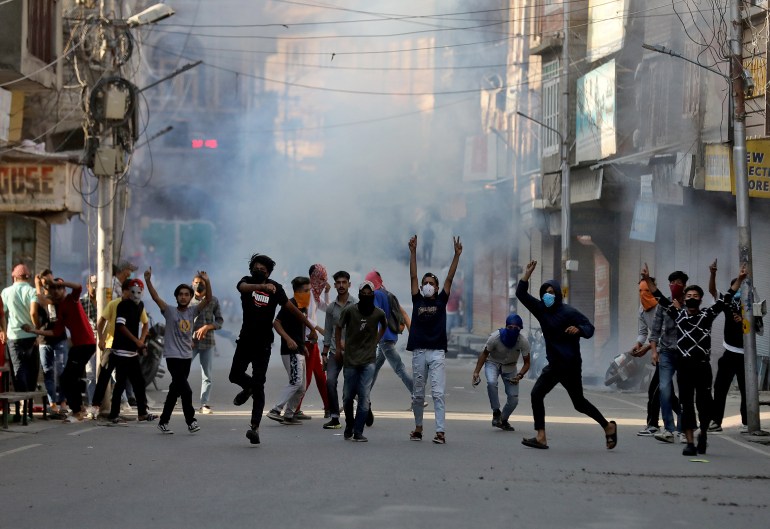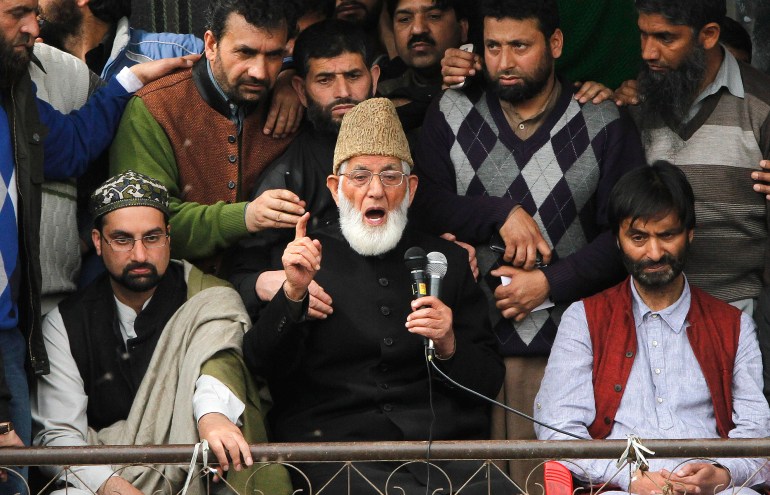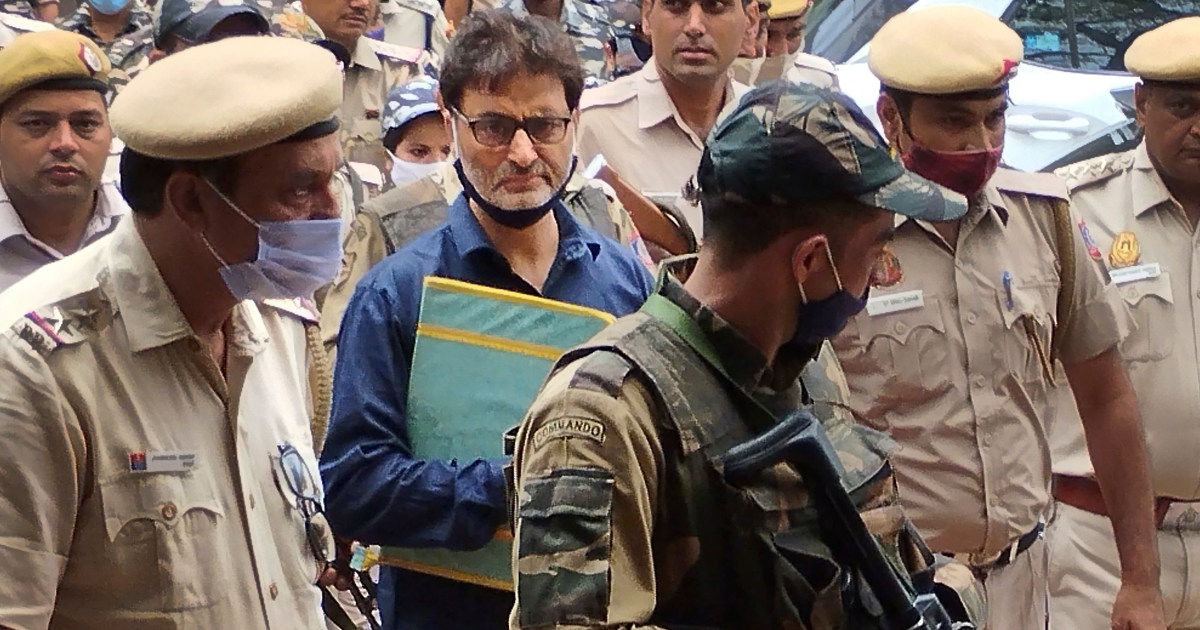Yasin Malik’s journey: From gun-toting Kashmir rebel to Gandhism
From holding a Kalashnikov rifle to becoming a self-avowed follower of Mahatma Gandhi, the last 30 years of legendary Kashmiri rebel leader Yasin Malik’s life have remained a struggle against the Indian rule in the disputed region.
Malik, 56, was sentenced to life in prison last week after he was convicted in a terror-funding case, to which he pleaded guilty.
Malik is among key separatist leaders in Indian-administered Kashmir who advocate a peaceful resolution to the decades-old conflict and warn of the dangers the lingering dispute poses to peace and development in South Asia.
Malik heads the Jammu and Kashmir Liberation Front (JKLF), a group that advocates for a Kashmir state independent from both India and Pakistan, who each govern over parts of the Himalayan region but claim it in its entirety.
The JKLF was among several separatist groups banned by the Indian government in 2019 for their “secessionist ideology”. The ban was followed by a widespread crackdown against separatists and rebels, most of whom continue to remain in jail.
Later that year, shortly after Prime Minister Narendra Modi was re-elected to power, the Hindu nationalist government headed by Modi scrapped Indian-administered Kashmir of its special status, divided it into two federal territories and imposed an unprecedented security shutdown in the valley, during which thousands of Kashmiris were arrested and imprisoned.
Malik’s conviction is being seen as a final effort by Modi’s government to leave Kashmiri pro-freedom groups without leadership – one of the objectives behind India’s 2019 moves.

Taking up arms
Malik was born in 1966 in Maisuma, a locality in the heart of Indian-administered Kashmir’s main city of Srinagar. Before revocation of the region’s special status, Maisuma was known as the “Gaza of Kashmir” for its relentless anti-India protests.
For Malik, the defining moment came in 1987 when the Indian government was accused of rigging the assembly elections in collusion with the National Conference, the main pro-India political party in Indian-administered Kashmir that has governed the region for most of the last seven decades.
In that election, Malik was campaigning for Muhammad Yusuf Shah, one of the leaders of the Muslim United Front (MUF), a conglomerate of parties demanding a referendum to break away from India. Analysts say the MUF was on its way to victory when the polls were rigged.
The rigging of the 1987 polls sparked unprecedented anger in the region, which saw thousands of Kashmiri men, including Malik, crossing over to Pakistan for arms training and returning to fight against the Indian rule.
Shah is now based in Pakistan with the name Syed Salahuddin and heads the Hizbul Mujahideen, one of the prominent anti-India armed groups.
Malik returned from Pakistan in 1989 to head the JKLF, the first outfit to declare an armed rebellion in Indian-administered Kashmir.
In December of the same year, the group kidnapped Rubaiya Sayeed, the 23-year-old daughter of then Federal Home Minister Mufti Mohammad Sayeed, also a prominent Kashmiri politician.
Sayeed was released five days later after New Delhi agreed to JKLF’s demand of releasing five of its members.
Turning a Gandhian
Malik was arrested in 1991 on several charges, including Sayeed’s kidnapping. When he was released in 1994, he was a changed man and decided to give up guns.
Malik’s JKLF declared an indefinite and unilateral ceasefire with the Indian government. Since then, Malik had been advocating for a non-violent struggle for the region’s independence.
“He was everyone’s leader here. He lived a life of suffering for standing for a cause. We all are grieving,” one of his neighbours Ahmad, who did not want to be identified by his first name for fears of reprisal, told Al Jazeera.
After giving up arms in 1994, Malik took command of the JKLF’s political wing and became a leading campaigner for Kashmir’s freedom. Syed Ali Geelani, a veteran Kashmiri leader who rivalled Malik’s stature within the separatist camp, died last year.

While it became routine for Malik to be detained by the police and then released over protests for freedom, he remained persistent in mobilising crowds, organising shutdowns, and making calls for the boycott of elections held by India in the disputed region.
Malik’s JKLF was part of the All Parties Hurriyat Conference (APHC), a joint alliance of pro-freedom groups which was formed to give a political face to the separatist movement in the region, till the APHC split in 2003.
After the JKLF quit Hurriyat, Malik embarked on a Safr-e-Azadi (journey to freedom) – a year-long journey through the Kashmir territory to mobilise people for self-determination.
In 2006, Malik met the then Indian Prime Minister Manmohan Singh, but their dialogue did not reach any breakthrough. New Delhi continued to keep Indian-administered Kashmir under a tight noose, triggering large-scale street protests.
In 2010, Malik joined hands with top separatists Geelani and Mirwaiz Umar Farooq and formed a coordination committee to spearhead anti-India protests in the valley.
In the aftermath of the killing of top rebel commander Burhan Wani in 2016, the three top pro-freedom leaders again came together to form a Joint Resistance Leadership. The group led months-long agitation in the region over Wani’s killing by issuing protest calendars and calling for shutdowns.
The next year, Malik wrote an open letter to the United States administration for its “failed promises” on the resolution of the Kashmir issue.
“On the persuasion of US, UK, and European envoys, I took the most unpopular decision of unilateral ceasefire endangering my and the lives of my colleagues. [Despite] all odds and provocations by Indian forces to go back on the path of violence, I stood firm to my decision”, he wrote.
Over the years, Malik said in many of his interviews that he was also disillusioned with the position of India’s left-liberal class on Kashmir, accusing them of being “firefighters” of the Indian state in the region.
“It has become an unfortunate routine that in crisis time, (Indian civil society members) come to Kashmir, accuse their own government, sell big dreams to the people of Kashmir, but as soon as the crisis is over they pack their bags,” he said in a 2013 interview to Pakistan’s Dawn newspaper.
Kashmiri political experts call Malik one of the “tallest leaders in the region”.
“[By] giving him a life sentence, despite the fact that top Indian leadership, including former prime ministers, held negotiations with him, the Indian government wants to send a message that separatism in Kashmir would not be tolerated at any cost,” the analyst told Al Jazeera on condition of anonymity.
He cautioned that Malik’s sentencing “could be counterproductive as there is huge anger penting up in the valley and a small trigger could lead to violent street protests”.
“By deciding not to contest charges against him, Malik has also put a question mark on the whole judicial process and the independence of the Indian judiciary,” he added.




